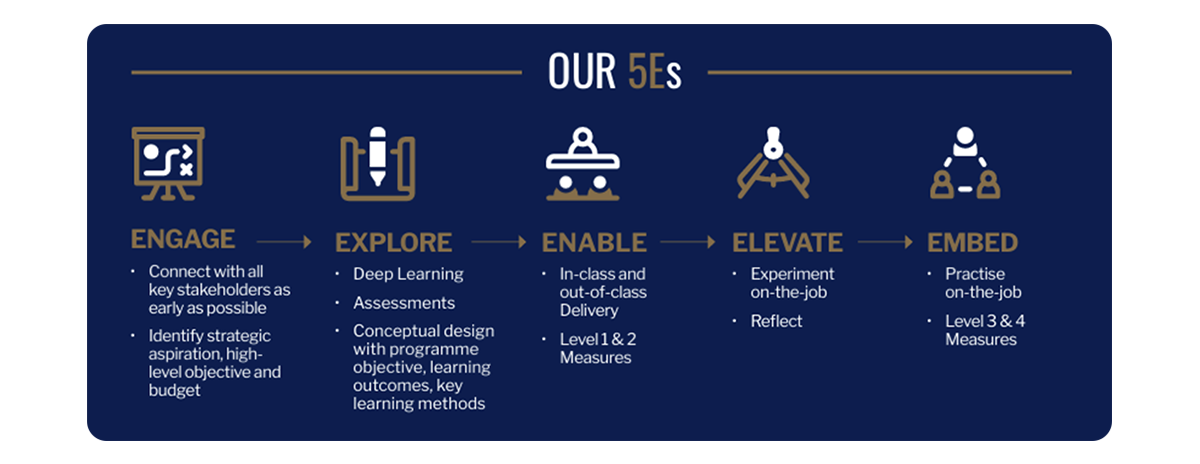
Organisations today face a dilemma when considering executive development and corporate training: Do you choose a proven short course to upskill talents quickly, or invest in a bespoke custom programme that aligns learning to strategic outcomes? Is there a right answer to this dilemma?
Short Courses vs Custom Programmes
François Bogacz, Head of Learning & Innovation at SMU Executive Development explains that short courses have their own strengths. They scale quickly, introduce common language and learning outcomes across cohorts, and deliver targeted employee development and senior leadership skills. Examples include refining the leadership skills of middle managers and team leads in a sales department.
However, when organisations face complex and cross-functional challenges, learning must be designed to influence behaviour throughout the organisation. That’s when custom corporate training becomes a purposeful tool for organisational performance. Custom programmes would prove valuable in an organisational shift, i.e., how it delivers value, embedding new strategic processes or aligning corporate culture with strategy.

On the one hand, if the capability gap is urgent and largely individual, a short course is often the fastest, cost-efficient answer. On the other hand, custom programmes are designed to influence systems."
François Bogacz
Head of Learning & Innovation
SMU Executive Development
At SMU Executive Development, we offer a suit of Short Courses, Custom Programmes,Partner Programmes, and Immersion Programmes.
Now, the question becomes “How do you evaluate an executive development partner?”
Three Key Principles of SMU’s Executive Development to Unlock Value with a Custom Programme
1) Co-creation & Partnership
We start by listening because every organisation is unique and the context in which the business operates matters.
An effective custom programme begins with a deep diagnosis of organisational priorities, stakeholder needs and constraints. This involves a deep inquiry and provoking discussions on new thinking, ways of working and fresh insights.
"Our approach ensures we take care of all the details that create a great individual and organisational learning experience that delivers impact," François explains. "A co-created programme helps better maximizing learning transfer when leaders have helped shape it and take ownership of its outcomes for their employees’ professional development."
2) Programme Methodology
In developing a custom programme, SMU Executive Development’s 5E’s Methodology entails:
- Engage: Early engagement with key stakeholders where we identify strategic aspirations and objectives.
- Explore: Exploring, conceptualising and assessing a programme design that aligns learning outcomes with learning methods.
- Enable: Enabling the optimal learning experience through a real-world lens with practical applications and business simulation.
- Elevate: Elevate the learning by encouraging participants to experiment with new skills and concepts on the job.
- Embed: Embedding a strong motivation to make learning “stick” in day-to-day activities once the learning is done.
This ensures that participants are aligned, practice new behaviours in real contexts, and embed those behaviours into business-as-usual activities through coaching and manager enablement.

3) Impact & Results
Every custom programme designed must answer the question: “How will this change work?” We define success with organisations by identifying behavioural indicators, attitude shifts, and business KPIs through mixed-method evaluation.
For example, with a baseline diagnostic, impact may be measured through on-the-job assignments tied to client/business KPIs, internal surveys and stakeholder. These data points are a way to iteratively refine the programme and report credible impact to organisations.
Case Study: Wisdom Key Custom Programme
As a Singapore-based platform specialising in knowledge training and business consulting, Wisdom Key works closely with entrepreneurs and high-net-worth individuals navigating the journey of corporate and wealth globalisation. It partnered with SMU Executive Development with the aim of strengthening the skills of participants to navigate the complexities of business and wealth globalisation.
The bespoke programme combined co-creation (curriculum designed with client context), practitioner-led clinics and immersive field visits. Wisdom Key Custom Programme Outcomes:
- Entrepreneurs left with a clearer, systematic framework for deciding if, when and how to globalise—some pivoted to strengthen domestic positions, others refined international strategies with renewed clarity.
- High-net-worth individuals gained structured insight into the opaque family-office landscape in China, adopting global wealth-management principles that reshaped long-term planning and legacy thinking.
- Financial institutions & advisers deepened their strategic capability, using global frameworks to better serve clients and expand their professional offering.
What this means for HR and Business Leaders
- Executive education should not be narrowed down to just online short courses.
- Instead, it should be viewed as a tool for organisational change when designed with the right intent, measurement, and methodology.
- Short courses accelerate skill uptake; custom programmes shape the organisation to new realities.
- The best decision is to choose the path that aligns with your needs and to choose partners who co-create, measure impact, and embed learning for scale.
If your organisation is facing strategic complexity and needs a partner to co-design a path to impact, explore SMU Executive Development’s custom programmes and how we can help you unlock value from learning to impact.
Speak with us at exd@smu.edu.sg for a free and no-obligation consultation. Alternatively, write to us here and we will respond within a few days' time.